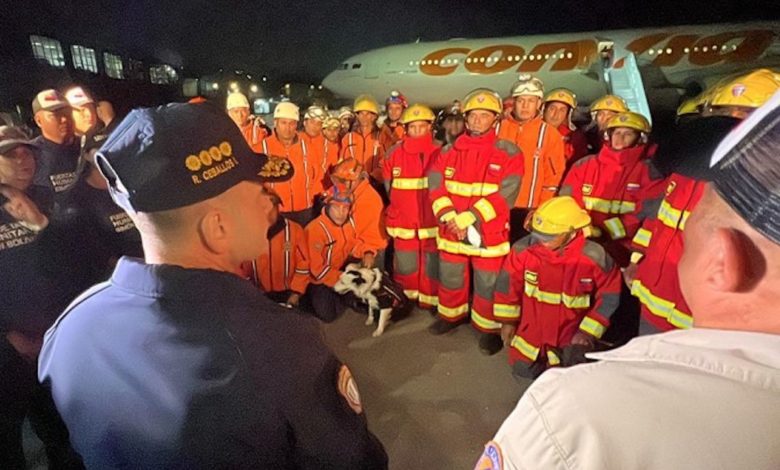
Since Feb. 6, more than 41,000 people have been killed in a devastating 7.8 magnitude earthquake spanning large areas of Turkey and Syria. With casualties rising daily, U.S. sanctions against Syria are preventing much-needed relief and infrastructure support from entering the affected areas there. As a result, Syria, already devastated by the western-backed conflict, has received almost no international humanitarian assistance, leaving thousands still impacted.
The exception has been those from countries whose economies have also been devastated by U.S. sanctions. The governments of Cuba, Venezuela, Iran and China, Palestinians in Gaza and Hezbollah in Lebanon all rushed aid to Syria.
Temporary lifting of sanctions is too little, too late
Four days after the initial quake, the U.S. State Department announced a temporary lifting of sanctions on Syria only due to mounting public pressure. Bassam Sabbagh, Syria’s Permanent Representative to the United Nations, described the 180-days U.S. sanctions exemption as “insufficient to adequately offset the dire consequences of [the United States’] coercive measures” in the region. A statement released by the Syrian Ministry of Foreign Affairs and Expatriates said, “the misleading decision taken by the U.S. administration to temporarily ease some of the cruel and unilateral sanctions on the Syrian nation is out of shame and hypocrisy and is no different from previous gestures meant to convey an erroneous humanitarian impression.”
Even with sanctions exemptions, countries are hesitating to send aid fearing unbeknownst financial and political consequences from the United States, which severely punishes those who violate sanctions that it imposes. Some countries have pledged support for Syria, however, their material aid has only been localized to rebel-held territories.
Italy is the only western government so far to send aid, and its planes had to land at the airport in Beirut, Lebanon, because the Caesar Act — part of the U.S. sanctions still in effect — forbids planes from landing in Damascus. Having to cross the border from another country significantly delays aid from reaching the areas where it is needed.
While western and European countries withhold aid, countries historically repressed and sanctioned by the United States have heroically responded to the needs of the victims. Cuba, Iran, Venezuela, China, Russia and Palestine rushed to send supplies to Syria. Cuba sent multiple groups of medics, including 27 medics to Syria. The Venezuelan Simon Bolivar Humanitarian Task Force sent 25 specialists to Syria. Ordinary Palestinians in Gaza, even with ongoing blockade and killings by Israel, launched a blood donation drive to support the injured. Hezbollah of Lebanon, also sanctioned by the United States, was quick to send aid convoys to Syria.
Terrible toll of war and 13 years of sanctions on the population
This earthquake was the largest in the region since the 1268 Cilicia earthquake and the 1822 Aleppo earthquake. Since the initial Feb. 6 quake, the region has experienced more than 2,100 aftershocks and has suffered upwards of $80 billion in infrastructure damage. The UN said earlier this week that in Syria more than five million people are facing homelessness as a result of the quake. UN aid chief Martin Griffiths said the world has failed the people of northwest Syria.
It is the ordinary Syrians who are shouldering the extraordinary burden of the brutal U.S. sanctions imposed since 2011. Within five years of the start of the conflict over 80% of civilians slipped into poverty with no respite in sight. According to a 2019 UN report, ordinary Syrians are the direct victims of western sanctions, and that the unjust sanctions have caused food shortages and has been a “principal factor” in the breakdown of the Syrian health care system.
At the time the quake hit, sanctions had created shortages of fuel for vehicles and heating homes, as well as shortages of medical supplies, hospital equipment and food. So these regions now under rubble did not have cranes and bulldozers for rescue efforts as they had been destroyed in the civil war, and there was no fuel for rescue vehicles.
Additionally, parts of Syria hardest hit by the earthquake have been under rebel control for the last decade and the conditions were already dire there. After more than a decade of civil war, fleeing refugees in the area live in makeshift tents with little to no access to basic services. The earthquake and the lack of meaningful aid only amplified the uninhabitable climate.
These rebel-controlled areas wouldn’t exist without the backing of the United States. The United States has systematically looted Syrian oil and wheat and other national resources — causing direct and indirect losses amounting to more than $20 billion, and contributing to the fuel and food insecurity.
The last decade of the U.S. illegal occupation and support of extremist forces has crippled Syria’s ability to return to a functioning state, yet the western media ignores who is really responsible and blames Syrian President Assad for all that goes wrong in Syria.
Meanwhile, funds are being blocked from getting to Syrian government-controlled areas, but allowed to go to rebel groups. For example, GoFundMe, a popular fundraising platform, suspended multiple crowdsourcing efforts in the United States and Germany from reaching Syria citing U.S. sanctions, but instead paraded raising over $100,000 for the White Helmets, a known rebel-affiliated group and a western puppet.
It’s time to demand that U.S. State Department removes all sanctions on Syria once and for all, for the United States to get out and stay out of Syria.





